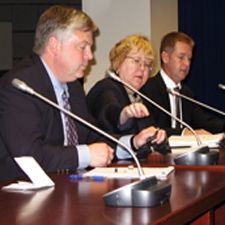BETHESDA, MD (BRAIN)—Representatives from the Bicycle Product Suppliers Association met with CPSC staff Wednesday to appeal a petition that seeks to exclude kids’ bikes from new regulations on lead limits. The BPSA made the petition on behalf of its 85 member companies and the industry at large earlier this year.
Bob Burns, head of the BPSA’s legislative committee, attorney Erika Jones and BPSA president John Nedeau told Commission staff that bike suppliers have been working to make components on kids’ bikes that contain lead exceeding the new limit inaccessible, specifically Schrader valves.
In addition to inaccessibility, the BPSA asked the CPSC to consider its petition based on a few other factors. Component manufacturers source recycled metals, so the possibility of lead content that exceeds the limit exists and can’t be fully controlled; repair and spare parts would likely still exceed the limits; and the new law would also prohibit the sale of used bikes that contain components exceeding the limit.
“The used bike market is large and serves the underserved,” said Burns, citing Dream Bikes, a nonprofit that opened last year in Madison, Wisconsin, and sells affordable used and donated bikes to disadvantaged youth. “And the used bike market as a whole is larger than Dream Bikes.”
The CPSC brought up the possibility of using alternative metals, such as titanium or steel, as well as virgin materials to meet the standard. Both options would significantly add to the cost of manufacturing, and ultimately the retail price of a kids’ bike, which the market could probably not sustain, Burns said.
CPSC staff also inquired about inventory turns, manufacturing lead times on new bike components and European standards governing lead content on bikes. The bike industry has had to comply with these standards to sell product in Europe.
New kids’ bikes, estimated at an annual value in excess of $500 million, represent a substantial chunk of retail and supplier sales and the overall bike market, Nedeau said.
Another problem is high testing costs. A mass supplier that recently conducted lead testing on 233 different parts on a kids’ bike and got a discount from the testing lab still had to pay $60 to test each component, racking up a $14,000 bill on a bike that retails for $50, Jones said. “While you can’t take cost effectiveness into account, the retail sector has to and that bike won’t be around,” Jones said.
No decision was reached on the appeal of the petition.
The hearing was the second to take place since the passing of the new law last July. The BPSA met with the commission in November to voice concerns regarding the law’s impact on the bike industry.
—Lynette Carpiet
Photo: Bob Burns, head of BPSA's legislative committee, attorney Erika Jones and John Nedeau, BPSA president answer questions from the CPSC staff on how a new lead law impacts kids' bikes


